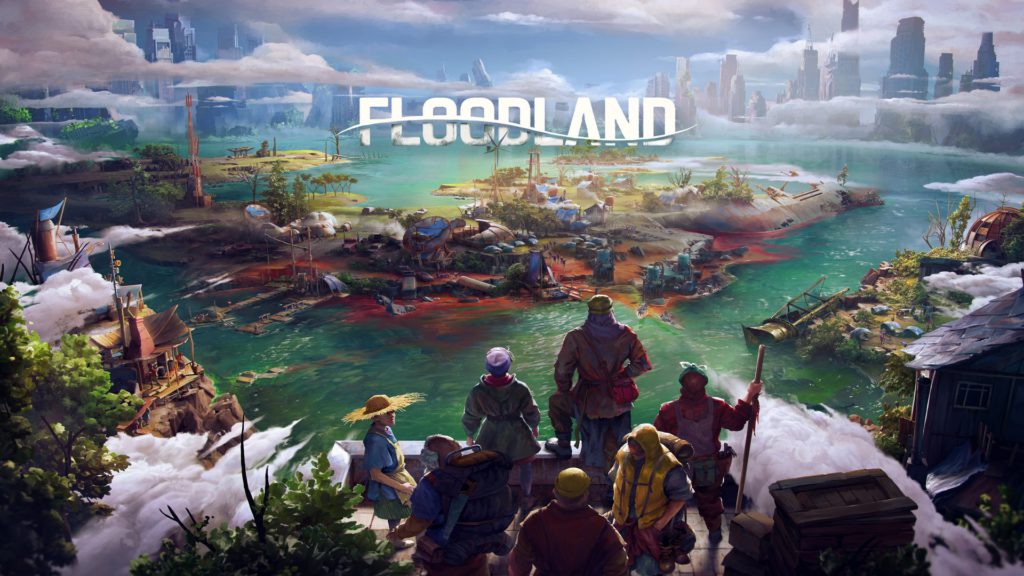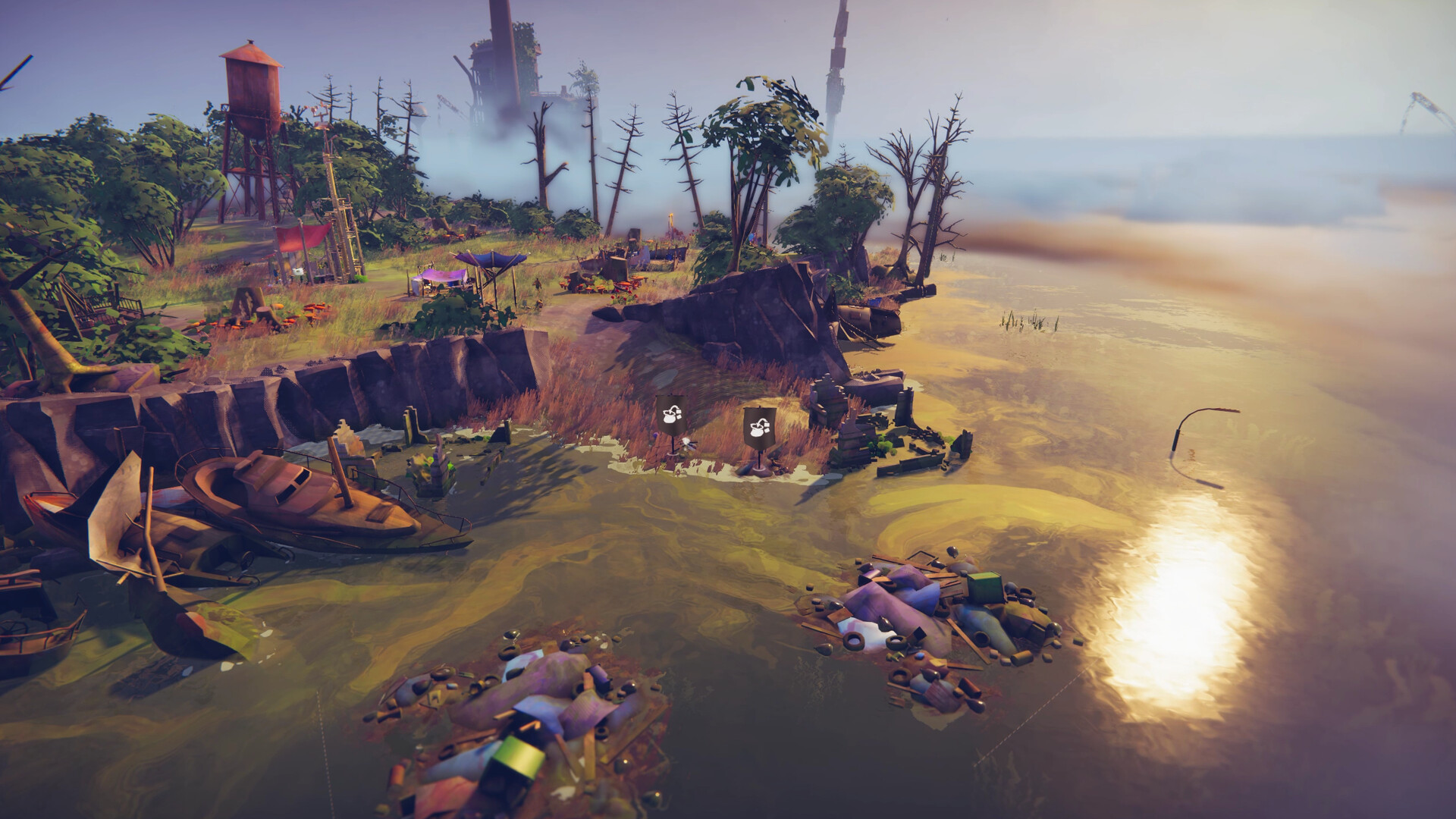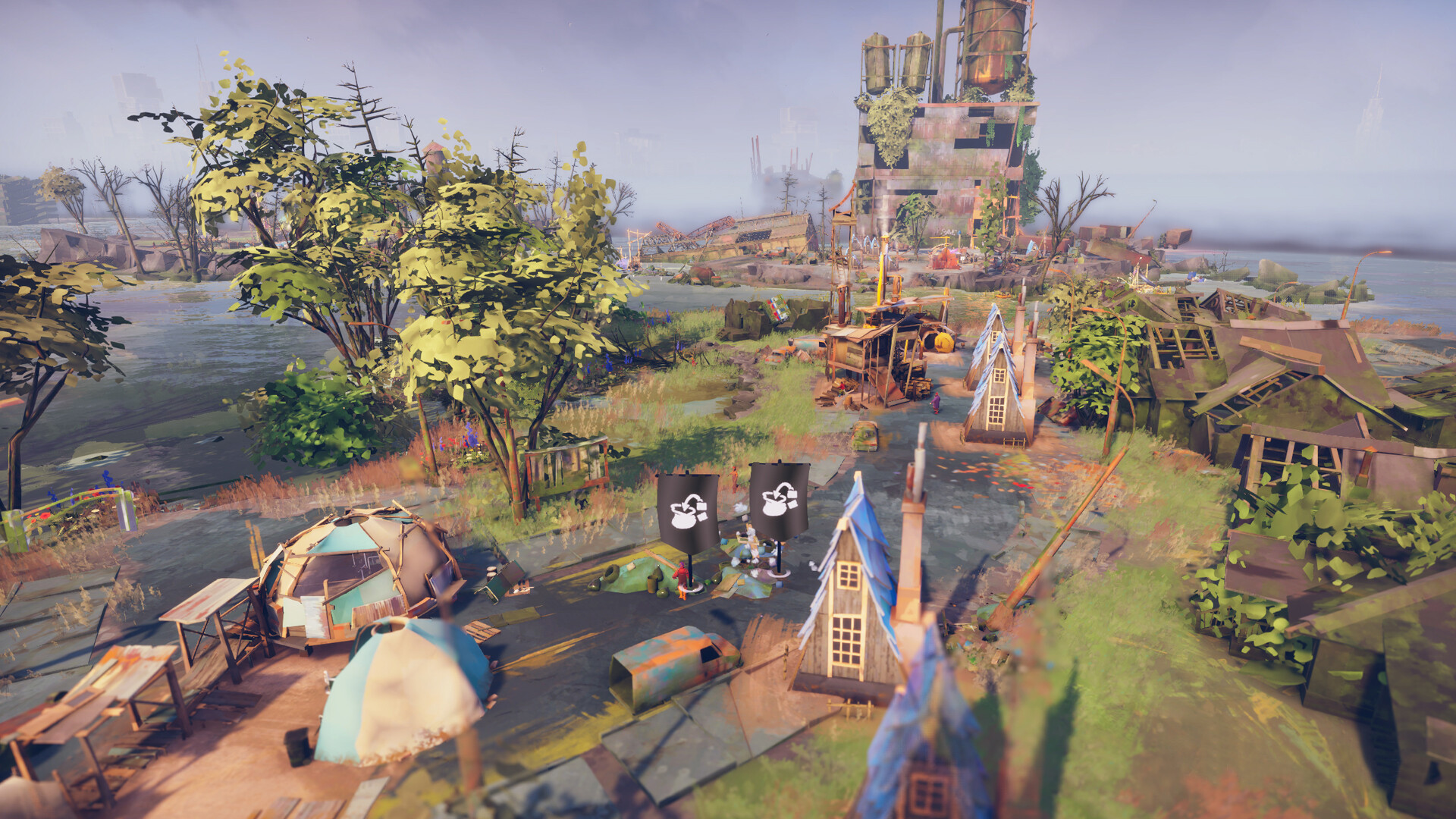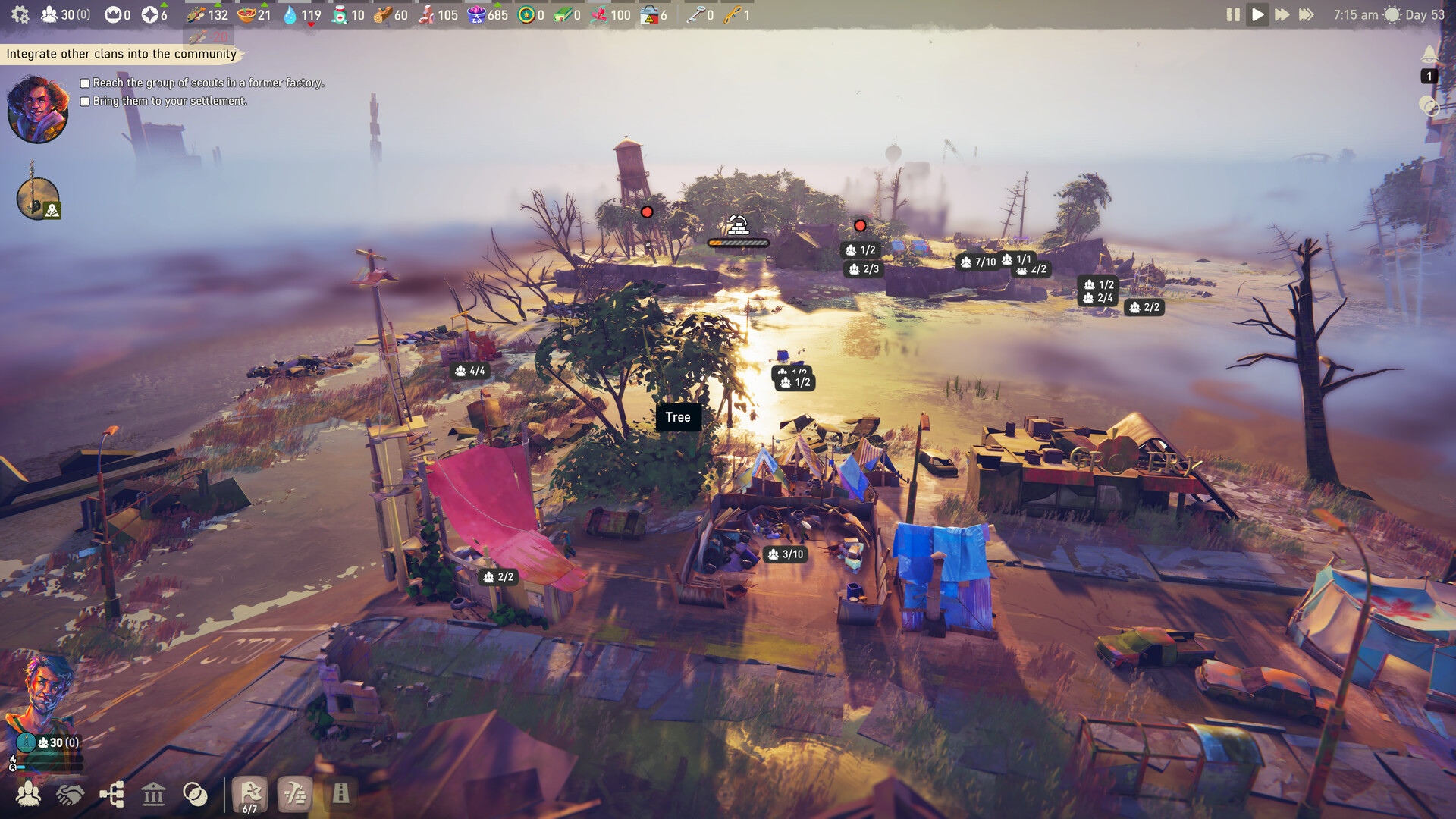
It’s the end of the world as we know it, or at least, a world that isn’t set adrift by water. So where do all the people go? That’s the question the team at Vile Monarch seeks to answer with post-collapse survival city-builder sim, Floodland.
Most of the world’s population has been swept away by “The Event” and climate change has taken over. Tsunamis and floods have destroyed cities and water is now blanketing the majority of the land. We’re quick to learn humanity has been making waves, meaning the collapse was a long-time coming amidst rising tensions and unrest. We’re tasked with rebuilding a new world or failing in one that’s already falling apart. With a small clan of survivors, you set out to start over with a hard cleanse from the mistakes of the past, away from civil unrest and reliance on over-development.
From the starting menu, the art and music were an immediate stand-out. A mellow folk song plays as adrift survivors overlook a flooded cityscape, leading into a captivating opening with stunning painterly visuals, we’re given a run-down of the ripple effect of humanity’s downfall. The voice-acting by one of the four narrators is crisp and sets the tone for a hopeful future rather than dwelling on what’s happened.
From the jump, the first task is to select a leader, each bringing along their worldview and clan traits. These specialisations provide different benefits for survival but can also hinder progress, especially when worldviews cause clashes between clans. As the leader, you’re tasked with overseeing daily functioning, managing laws, clan relations, and actioning change. This is where the reality of your duties and the tough decisions you need to make start to survive sink in.

Once the person steering the hypothetical ship has been elected, it’s time to get started. There’s a small clearing surrounded by fog, submerged cities in the distance, and all I had was a small plot of land and a few survivors. The murky atmosphere set the tone for what was to come, and what was there was strangely vibrant and beautiful, despite how devoid the isometric landscape was.
As my settlers found their feet during the prologue, an emotive folk song kicked in, with the vocals of the opening song delivering a powerful message of struggle and growth before taking it down to mellow background music. My small community began with a singular storage facility littered with a few tarps. It was back to basics from here. The tutorial provided me with enough tasks to come to build the bare minimum. I began with the simple things; palatable food, clean water, and shelter, then expanded to accommodate more people and greater needs.
The opening provides a good basis for understanding the fundamentals, but I found that when I reached the prologue, I was already struggling to manage resources I’d wiped out during the opening. It tended to be an information overload and the UI was not quite as intuitive as I’d have liked. Luckily, to remedy this, icons could be hovered over to remind me of what was required to push forward. Managing menus could be quite overwhelming, especially considering the excessive expansion trees, laws, and level-up menus.
The tutorial is entirely skippable, starting from a fairly established little society to get straight into the exploration. For first-time players, the guidance is advisable even though it can be a lot to take on. Without it, there’s way too much burden to bear alone. Time can be paused, sped up, and slowed down, allowing an opportunity to process the next steps, but as far as leniency goes, this is when it comes to difficulty. Any survival tips early on are crucial to success.

Four difficulty tiers can be customised to alter resource spawn rates, how fast satisfaction depletes, and the speed at which epidemics hit. My first attempt was on the default settings and I barely survived the tutorial. Once I was on my own, I quickly realised the overabundance of water wasn’t going to hydrate the masses for long. My water filtration became contaminated, and within a matter of minutes, ironically, I ran out of water, and with barely enough time to gather resources to recover, swiftly wiped out my colony.
In my next attempt, I tried to be more methodical regarding the story’s difficulty. Not knowing what challenges I’d need to face next meant foresight was not necessarily tactful, instead, it was a gamble as to when I’d have to sacrifice one priority for another. The freedom to take risks was severely hindered by the lack of necessities. Progression was often stunted by the pursuit of knowledge to boost development opportunities. Being restricted by finding old-world relics, which is a challenge in a submerged world with very few ruins, to develop further was a slog. The slow progression versus the frequency of setbacks sets some serious pacing complications.
Complications in Floodland involve combatting starvation, disease, crimes, epidemics, and the need to make tough decisions for the betterment of society. As you gather more clans to your cause you’ll gain advisors and potentially some compatibility issues. Making tough decisions and engaging in the thankless task of keeping as many people as possible happy or risking another collapse is both a strength and weakness of this title depending on what kind of challenge you’re after.
One wrong move and recovery becomes a pipe dream if not immediately dealt with, especially when relations between clans start to escalate. Sometimes people were, dare I say it, too needy, and no matter how overstocked my provisions, I was still being notified of their distress. Issues like this tended to put a damper on the experience with no time to recover before the next issue.

Each survivor is a precious resource in providing labour and sustaining the colony. There’s an extremely delicate balance between survival and humanity destroying itself. My people were fairly independent once I set them up in their tasks and if I was optimising time with short commutes to their homes on clock-off. Time is the most valuable resource of all but often working against it led to a quick merciless end. Occasionally my workers would make their work-home commute too long by living in a far away tent despite building shelters next to their jobs. Most of these issues were fairly manageable, but the need to be hyper-aware of workers wasting time and reduced productivity sometimes became too inconvenient to the bottom line.
Performance was mostly fine for me and the game ran smoothly with no noticeable drops. My biggest issue was slow loading on start-up and the slow autosaves that would briefly pause my game. Overall, the game ran fine on the highest graphical settings while playing, and it looked flawless while doing so.
Despite shortfalls, attempting to save my people from collapse became something I was determined to do, and I sunk quite a few long sessions to do so. While wading through trials and tribulations was a lot of pressure, I was curious to see if I could overcome all obstacles. The motivation to be the best leader possible became the ultimate endgame for me, but sometimes the pacing got in the way of my experience.
Floodland delivers a thought-provoking glimpse into what could happen if climate change ramped up. With an overabundance of mechanics and scarce resources, survival seems to be a punishing and often unachievable goal. The foundation is there but there’s still more room for growth. Overcoming hardships is rewarding but not necessarily an experience where the word “fun” comes to mind, rather, engaging, and asking the big question, what would we do in this situation? For hardcore city-sim fans, there’s something to be explored here. For players looking for a more relaxed expedition, this one may prove to be too much to survive. I’m still fighting for my people and want to see it to the end, and hopefully, one that ends well… Let’s hope.

The Good
- Visually stunning isometric design and UI art
- Fully voice-acted cutscenes, strong folk background music
- Engaging, original take on post-collapse simulators
The Bad
- Difficult to micromanage among vast mechanics
- Forced into certain skill tree paths to progress
- Resources too scarce to try different approaches








